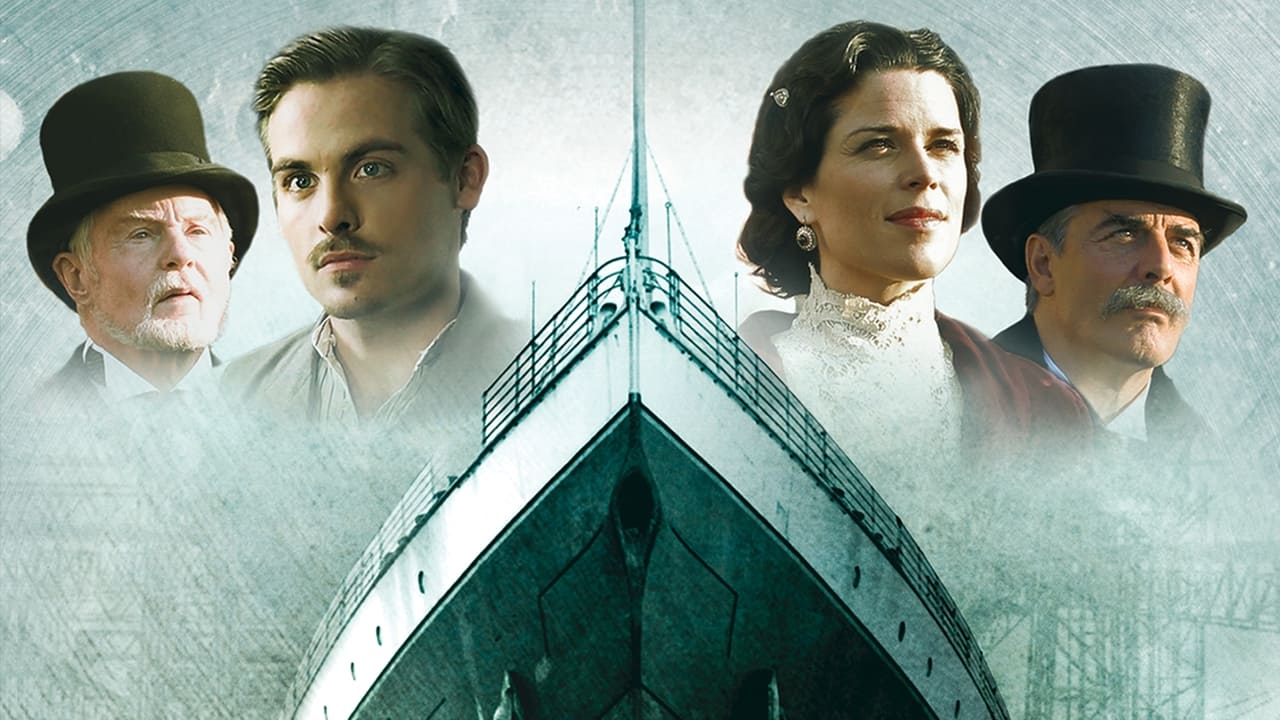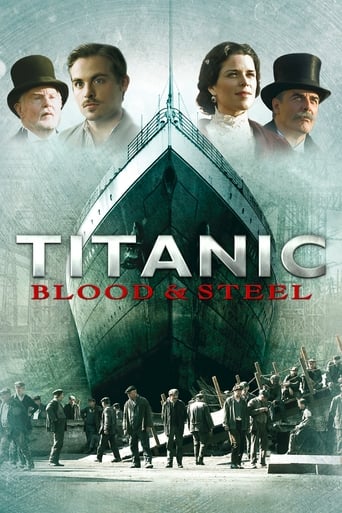

Instant Favorite.
... View MoreA different way of telling a story
... View MoreThere's a good chance the film will make you laugh out loud, but if it doesn't, there's an even better chance it will make you openly sob.
... View MoreWhile it doesn't offer any answers, it both thrills and makes you think.
... View MoreOpulent miniseries that chronicles the years leading up to and during which the Titanic was constructed in Belfast. As with something this complex some of the stories are more compelling than others as are some of the performances. Kevin Zegers holds the screen well in the lead, his startlingly blue eyes pulling you in. His storyline and several others intertwine and lead to interesting bits of history as well as storytelling. Neve Campbell's reporter storyline however feels superfluous. The best performance comes unsurprisingly from Derek Jacobi as Lord Pirrie. Effiiciently directed this moves along well with very few slow patches. Overall a good, if long, view with some soapy complications thrown in for good measure, but keep in mind this focuses on the building of the ship, not the ill-fated voyage itself.
... View MoreBefore I start, readers should be aware that I expect filmmakers to respect the intelligence of their intended audience. I am able to appreciate the effort behind a good production and won't hesitate to compliment those of whom were involved. I'm almost a perfectionist when it comes to entertainment, so understand that the review you are about to read comes from someone who isn't prone to gushing with platitudes.I came into "Titanic: Blood and Steel" with an open mind and after viewing 10 of the 12 episodes I feel truly rewarded in a way not sensed since "Road to Perdition" or "Out of Africa" before that. It isn't to say I was moved in the same way each time for they were great productions all their own. But this a truly professionally executed example of filmmaking.This series is very well-acted from the legendary Derek Jacobi as Lord Pirrie to the small part players. I especially like the performance of Ophelia Lovibond as Kitty because I feel almost as if I've traveled back in time whenever her character is on. I could go on about all the fine acting. The production values are nearly perfect but I have to say that the CGI rendering could have been slightly better. But hey, the matte backgrounds of many classic movies are obvious too.If you watch this series expecting a documentary-perfect telling of events, you will be disappointed. This is a portrayal of fictional characters in fictional story arcs centered upon the factual events surrounding the conceptualization, construction and eventual fate of the Titanic.I am absolutely hooked on this story and with two episodes to go I'm already mourning the fact that it will be over. I feel that this is one of my ten best films of all time even as I speak as somewhat of a history buff who demands accuracy. I'm not one who watches a series such as this. My usual entertainment consists of NFL football, EPL soccer and scientific documentaries.With all the dreck coming out of Hollywood during my almost 53 years of existence, its refreshing as well as encouraging to witness such a fine effort from people who respect the tastes and intelligence of the viewers.Bravo!
... View MoreThough I've always been haunted by the story of Titanic's tragic voyage somehow I've never been familiar with it's history - where and how it was built, so I was excited when the mini series were announced. It sounded like a very ambitious project back then, but I've heard very little about it afterwards and was surprised when I recently discovered it aired long ago and went generally unnoticed. For the first five episodes I just bought everything without doubting it's validity. Then I checked with Wikipedia and found out all about the blatant historical inaccuracy, but it did not actually put me off. The story itself is good enough, the main problem is in it's *pacing* and *editing*. From the very beginning and right to the end it was very uneven, some events and their outcome felt quite unnatural and odd and it felt almost as though a lot of things (certain events, plot turns, character personalities etc.) were changed or made up as they went along. In the end character's personal problems have almost completely overshadowed the building process – not quite fair to Titanic itself since the series were meant to be primarily about it. A lot of time has been devoted to the constructional problems, but essentially no information at all was given about the work on the ship's insides, which no doubt would've been no less interesting then the work in the yard. Considering the acting – it was mostly well-done (specially by the *older* generation), and I'd like to mention that Kevin Zegers keeps surprising me every time I stumble upon him on screen, there is a diversity in his choice of roles that keeps me interested. But my own personal favorite was Thomas Andrews Jr. (played by Billy Carter). Again, Wikipedia specifically points out that the personality of the real life Mr. Andrews was vastly different from the one presented in the series, but as a character he is likable (being hardworking, earnest and upright), sympathetic and his impending fate really does strike a chord. All in all, despite some obvious production flaws and already established historical inaccuracy, the series manage to keep the viewer interested and produce some really moving human stories.
... View MoreAs a maritime and Titanic author and historian, I was quite interested to see this production, as it focused on the construction of the legendary liner and came at things from a unique perspective. Unfortunately, I am beyond disappointed (appalled would be a more apt word) by the historical errors that made their way into the miniseries.I have been working my way through the 12-part miniseries, trying desperately not to shred the arms of my chair or grinding my teeth to powder in so doing. Although the production might be an enjoyable piece if it were purely fictional, the history of the Titanic became a tragic, jumbled mess in this production.In some respects I found that it captured the period. However even there the effect was not complete; for example, the "jazz" music in the early-episode society scenes was about 10-15 years too premature, and that's something that anyone could get right.Was it poor research that caused this historical monstrosity? Apparently not. Why? Because of how many little details they apparently had easy access to and saw fit to include in the production (i.e., the number of passengers on Olympic's crossing where she tangled with the Hawke, the design of the Great Gantry, the fact that the riveters were paid by the rivet, the way the rivet seals were tested, the name of the British Board of Trade inspector, etc.). Meanwhile, the production included an overwhelming number of serious historical errors, many of which were easier to "get right" than the aforementioned factoids.Included in this list of grievous technical and historical mistakes are:* The "fact" that J. P. Morgan bankrolled and exercised great influence in the design and construction of the vessels. White Star paid for the vessels, and Ismay and White Star, rather than Morgan directly, had primary influence in the design and construction; * The steel issues, which is an older theory which has really been addressed and is blown entirely out of proportion in this production; * The blueprints for the Titanic shown from the opening credits through every episode, and which are actually, in every instance I noticed, of the Lusitania; * The slip that the Titanic was built on in the show is actually Olympic's slip; * The "fact" that the Olympic/Hawke collision (September 20, 1911) took place long before the launch of the Titanic (May 31, 1911) (???!!!); * The term "unsinkable" (or "practically unsinkable") is dreamed up and applied primarily to Titanic by the fictional character after the collision with the Hawke, when in reality it was introduced by White Star publicity and period Trade journals such as The Shipbuilder during construction of the two liners, and was applied to both equally. (Coincidentally, the special number of The Shipbuilder in which the term appeared is seen in the series long before Muir supposedly dreamed up the term); * The damage to the Olympic appears on the forward-port quarter of the hull, rather than the aft-starboard quarter; * Ismay saying that the Titanic would be 'much larger' than the Olympic; * Ismay didn't even have a speaking part, I don't believe, until the third episode; * The timing of any discussion regarding the possibilities of a double hull would have been back around 1907-1908 and applied to both ships, and would not have been applied solely to Titanic after the collision between the Olympic and the Hawke (in the end, a double-bottom was adopted for each); * The complete out-of-character, irritated, gruff behavior of Thomas Andrews throughout much of the first half of the series; * The worries within the yard that Titanic was just "too big" (the Germans were already starting work on the Imperator, which was still larger); * BOT Inspector Francis Carruthers was on site virtually every day of construction, yet he is not seen - until what, the fifth episode? - when he is lethargically tapping a couple of rivets. The implication is that Carruthers and the BOT exercised no real authority or oversight during construction, when in reality the original documentation and correspondence shows that they did not always see 'eye-to-eye' and had to work together to reach satisfactory results for both; * The concept that Harland & Wolff paid an unusually small amount of money to laborers (for the period, mind you) or were extraordinarily ungenerous in paying out benefits to families of those who were injured or killed in their yard (again, for the period). The record of payout benefits given to injured workers or to the families of those killed during construction of the two ships is still available and is actually quite high for the period.The list of egregious historical blunders just goes on and on. They are quite shocking in this series, especially since someone involved with the production/screenplay writing so clearly had access to little factoids that they saw fit to include. It was so badly done that I began to see in the fictional Muir character shades of the German Second Officer from the Nazi propaganda film, where he was the sole voice of reason warning everyone that the ship was doomed.If one even bothers to watch this miniseries, don't take anything in it as fact unless it is checked against leading research on the subject. In my view, this was a completely missed opportunity.
... View More